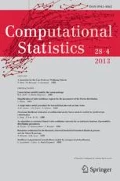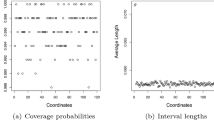Abstract
In this paper, we discuss a family of robust, high-dimensional regression models for quantile and composite quantile regression, both with and without an adaptive lasso penalty for variable selection. We reformulate these quantile regression problems and obtain estimators by applying the alternating direction method of multipliers (ADMM), majorize-minimization (MM), and coordinate descent (CD) algorithms. Our new approaches address the lack of publicly available methods for (composite) quantile regression, especially for high-dimensional data, both with and without regularization. Through simulation studies, we demonstrate the need for different algorithms applicable to a variety of data settings, which we implement in the cqrReg package for R. For comparison, we also introduce the widely used interior point (IP) formulation and test our methods against the IP algorithms in the existing quantreg package. Our simulation studies show that each of our methods, particularly MM and CD, excel in different settings such as with large or high-dimensional data sets, respectively, and outperform the methods currently implemented in quantreg. The ADMM approach offers specific promise for future developments in its amenability to parallelization and scalability.
Similar content being viewed by others
References
Boyd S, Parikh N, Chu E, Eckstein J (2011) Distributed optimization and statistical learning via the alternating direction method of multipliers. Found Trends Mach Learn 3(1):1–122
Chen C, Wei Y (2005) Computational issues for quantile regression. Sankhy\(\bar{a}\). Indian J Stat 67(2):399–417
Dempster A, Laird N, Rubin D (1976) Maximum likelihood from incomplete data via the EM algorithm. J R Stat Soc: Ser B (Methodol) 39(1):1–38
Eddelbuettel D, François R (2011) Rcpp: seamless R and C++ integration. J Stat Softw 40(8):1–18
Eddelbuettel D, Sanderson C (2014) RcppArmadillo: accelerating R with high-performance C++ linear algebra. Comput Stat Data Anal 71:1054–1063
Fan J, Li R (2001) Variable selection via nonconcave penalized likelihood and its oracle properties. J Am Stat Assoc 96(1):1348–1360
Friedman J, Hastie T, Höfling H, Tibshirani R (2007) Pathwise coordinate optimization. Ann Appl Stat 1(2):302–332
Friedman J, Hastie T, Tibshirani R (2010) Regularization paths for generalized linear models via coordinate descent. J Stat Softw 31(1):1–22
Gabay D, Mercier B (1976) A dual algorithm for the solution of nonlinear variational problems via finite element approximation. Comp Math Appl 2(1):17–40
Gao J, Kong L (2015) cqrReg: Quantile, composite quantile regression and regularized versions. https://CRAN.R-project.org/package=cqrReg, R package version 1.2. Accessed 2017
Gu Y, Fan J, Kong L, Ma S, Zou H (2018) ADMM for high-dimensional sparse penalized quantile regression. Technometrics 60(3):319–331
He Q, Kong L, Wang Y, Wang S, Chan T, Holland E (2016) Regularized quantile regression under heterogeneous sparsity with application to quantitative genetic traits. Comput Stat Data Anal 95:222–239
Hestenes M (1969) Multiplier and gradient methods. J Optim Theory Appl 4(5):303–320
Hunter D, Lange K (2000) Quantile regression via an MM algorithm. J Comput Gr Stat 9(1):60–77
Hunter D, Lange K (2004) A tutorial on MM algorithms. Am Stat 58(1):30–37
Hunter D, Li R (2005) Variable selection using MM algorithms. Ann Stat 33(4):1617–1642
Kai B, Li R, Zou H (2010) Local composite quantile regression smoothing: an efficient and safe alternative to local polynomial regression. J R Stat Soc: Ser B (Stat Methodol) 72(1):49–69
Koenker R (2005) Quantile regression. Cambridge University Press, Cambridge
Koenker R (2017) quantreg: Quantile regression. https://CRAN.R-project.org/package=quantreg, R package version 5.33. Accessed 2017
Koenker R, Bassett G (1978) Regression quantiles. Econometrica 46(1):33–50
Koenker R, Chernozhukov V, He X, Peng L (2018) Handbook of quantile regression. CRC Press, Boca Raton
Kong L, Shu H, Heo G, He QC (2015) Estimation for bivariate quantile varying coefficient model. arXiv:1511.02552
Li D, Li R (2016) Local composite quantile regression smoothing for Harris recurrent Markov processes. J Econom 194(1):44–56
Lin Z, Chen M, Ma Y (2010) The augmented Lagrange multiplier method for exact recovery of corrupted low-rank matrices. arXiv:1109.0367
Luo ZQ, Tseng P (1992) On the convergence of the coordinate descent method for convex differentiable minimization. J Optim Theory Appl 72(1):7–35
Mehrotra S (1992) On the implementation of a primal-dual interior point method. SIAM J Optim 2(4):575–601
Ortega J, Rheinboldt W (1970) Iterative solution of nonlinear equations in several variables. Academic Press, New York and London
Tibshirani R (1996) Regression shrinkage and selection via the lasso. J R Stat Soc: Ser B (Methodol) 58(1):267–288
Tseng P (2001) Convergence of a block coordinate descent method for nondifferentiable minimization. J Optim Theory Appl 109(3):475–494
Vidaurre D, Bielza C, Larrañaga P (2013) A survey of \({L}_1\) regression. Int Stat Rev 81(3):361–387
Wu T, Lange K (2008) Coordinate descent algorithms for lasso penalized regression. Ann Appl Stat 2(1):224–244
Wu Y, Liu Y (2009) Variable selection in quantile regression. Stat Sin 19(2):801–817
Xu Q, Deng K, Jiang C, Sun F, Huang X (2017) Composite quantile regression neural network with applications. Expert Syst Appl 76:129–139
Yu L, Lin N (2017) ADMM for penalized quantile regression in big data. Int Stat Rev 85(3):494–518
Zhang L, Yu D, Mizera I, Jiang B, Kong L (2017) Sparse wavelet estimation in quantile regression with multiple functional predictors. arXiv:1706.02353
Zou H (2006) The adaptive lasso and its oracle properties. J Am Stat Assoc 101:1418–1429
Zou H, Yuan M (2008) Composite quantile regression and the oracle model selection theory. Ann Stat 36(3):1108–1126
Acknowledgements
Jueyu Gao acknowledges the supervision of Drs. Linglong Kong and Edit Gombay during his graduate studies. The authors have no declarations of interest to declare.
Author information
Authors and Affiliations
Corresponding author
Additional information
Publisher's Note
Springer Nature remains neutral with regard to jurisdictional claims in published maps and institutional affiliations.
Drs. Linglong Kong, Bei Jiang, and Di Niu are supported in part by the Natural Sciences and Engineering Research Council of Canada (NSERC).
Electronic supplementary material
Below is the link to the electronic supplementary material.
Rights and permissions
About this article
Cite this article
Pietrosanu, M., Gao, J., Kong, L. et al. Advanced algorithms for penalized quantile and composite quantile regression. Comput Stat 36, 333–346 (2021). https://doi.org/10.1007/s00180-020-01010-1
Received:
Accepted:
Published:
Issue Date:
DOI: https://doi.org/10.1007/s00180-020-01010-1




